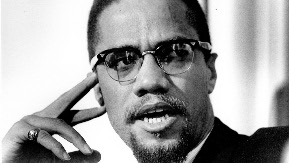Many aren’t aware Malcolm X was a champion of Black economic empowerment and business creation. Flickr.
[OpEd: Economic Power]
What is your view of Black economic development? Most Blacks say they are tired of being slighted and disrespected; yet the majority of us ignore tried and true capitalistic practices that would improve the race’s poor economic conditions.
It’s too bad there’s no accumulation of Blacks oriented toward race-based economic empowerment and wealth building. Black people collectively pooling economic resources aren’t the “wishful thinking” that many suggest. The thing we need to recognize is “to do for self‘”. When Blacks across the nation make economic growth and development functioning realities collectively practicing means and methods that create jobs and opportunities we will be well on our way to respect and admiration.
It is generally accepted that there’s been progress for Black Americans over the last 60 years, yet our overall status is bleak. Too many Blacks are focused to rid the country of “White supremacy”.
Black politicians and civil rights leaders boast that they’ve gotten black people to 72 percent parity with White people. Truth is Whites have “superior” understandings and adaptations of capitalistic procedures. Blacks must “stay awake” to more than partisan politics. Even as our poverty and unemployment rates continue to be higher than White folks’, it’s a challenge to get many Blacks to see benefits that can accrue if we come together and do more financially for betterment of our communities.
Black buying power is currently $1.3 trillion according to a Nielsen and National Newspaper Publishers Association Report.” With such money and buying power Black folk should be utilizing methods and practices that circulate those dollars to Black-owned initiatives.
Each of us should look at our own actions and practices that keep us from spending substantial portions of money we get with Black-owned businesses. Why do we not deposit in Black-owned banks when doing this enables Black financial institutions to fund our projects, goods and services?
To “be equal” in American society, Black folk must learn how to build businesses, to investment, hold onto assets and pass on the wealth. Some skeptical Black folk don’t see the value in spending their money with our businesses.
More Blacks must “do more for self” to bring about Black Economic Power. The prevailing Black Leadership has its focus on partisan politics and elusive “’racial harmony”. When will more Black folk learn that it’s imperative for concerned individuals, groups, organizations, churches and businesses to push vital Black financial and entrepreneurial cooperation in order to turn around disproportionate negative conditions that continue in Black communities?
Opportunities exist across the nation for Black individuals, their organizations, churches, lodges, fraternities and entrepreneurs to provide educational programs, workshops and business conferences that teach and show people how and why to do for self.
America needs local Black leadership demonstrating the power of the Black dollar and increased community awareness to recycle dollars within our community, by banking with Black-owned banks and buying from Black businesses.
The solution to the high unemployment and income inequality in Black communities must come from us. It includes development of Black businesses. Local or national groups, be them small or large: the thing is to “do for self.” If we are serious about tackling unemployment in our communities the quickest fix is to start financially supporting Black-owned businesses.
Too many Black folk expect other people to remedy their financial problems. Data suggests that if African-Americans invested more money in Black-owned businesses, these businesses would be sources of employment for more of us.
More Blacks must establish locations where people come and learn economic and financial principles on how to create and sustain Black businesses where they live. Let’s hold power networking conferences for training and networking to bolster and educate Blacks.
We all have to engage what we know and have toward operational unity. Enterprising individuals and organizations can sponsor regular business networking socials and gatherings. Do them at Black-owned establishments.
Be sure to invite Black folk involved in finance and banking. Those provide opportunities for entrepreneurial Black folk to meet one another, exchange ideas and to partner.
William Reed is publisher of “Who’s Who in Black Corporate America” and available for projects via [email protected]






